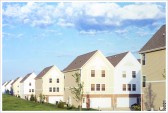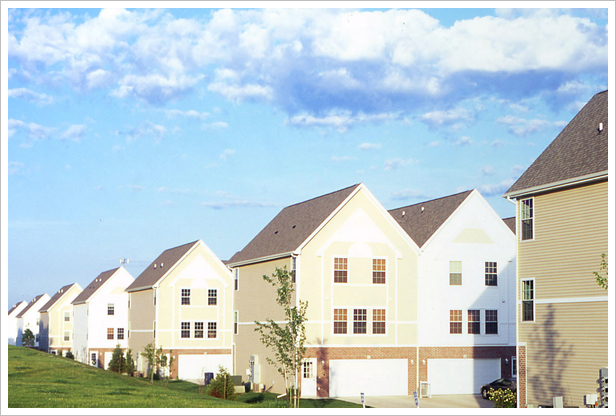 There’s an increasing tendency on the right to skip over technical discussion and real knowledge in order offer to offer a broad cultural “analysis” that simply calls one side “American” and the other side “anti-American.” James Poulos’ recent defense of the suburbs doesn’t quite fall into this category, but it comes unpleasantly close. The first problem with the piece is its take on how suburbs are built:
There’s an increasing tendency on the right to skip over technical discussion and real knowledge in order offer to offer a broad cultural “analysis” that simply calls one side “American” and the other side “anti-American.” James Poulos’ recent defense of the suburbs doesn’t quite fall into this category, but it comes unpleasantly close. The first problem with the piece is its take on how suburbs are built:
Some suburbs are masterplanned, but many aren’t — and the ones that are masterplanned often encourage more ‘real community’ than those that have sprawled out at random, without any logic or purpose, from one vast development to the next.
The fact that many suburbs aren’t masterplanned hardly makes them “random.” Zoning regulations require separated uses and tightly prescribe plot sizes and setbacks. Habitat for Humanity, which understandably refused to build homes for cars when some people lack adequate housing, clashed in the past with neighborhoods that require attached two-car garages.
Suburban building patterns also receive vast external subsidies. As Donald Shoup points out invaluable book The High Cost of Free Parking, the price of the so-called “terminal capacity” for cars (otherwise known as parking spaces) is generally paid for not by motorists but by property owners who are required to provide free parking. The total subsidy to auto owners in 2002 was estimated to be between $135 billion and $386 billion, a whopping figure in a year in which we spent $349 billion in the defense budget. Note that this subsidy, far from being unplanned, is usually legally mandated.
A common fantasy peddled by libertarians like Randal O’Toole is that the suburbs sprang forth from the American Id unplanned. But those sprawling developments are anything but random. The truly libertarian position would encourage a legal regime that gave freedom back to Americans to build in a denser, more random and less auto-dependent way, if and when they choose to do so.
But for Poulos this ultimately isn’t an argument about the liberty of Americans to build as they choose, it is (rightly) about culture:
If you do not like the suburbs, I suspect it is because you do not like the American propensity, deeper than even custom and habit, to move, and move, and move, and move.
I’m not sure what Poulos means here. The American ideal of home ownership shows a desire to homestead, to settle, not to move ever onward. I suspect what Poulos really means is that the suburbs enshrine an auto-based culture that allows commuters to fancy themselves white-collar Kerouacs while spending whole weeks of each year stuck in gridlock. That makes some sense. But if so-called post-modern conservatives want us to create massive economic inefficiencies, needlessly destroy local countrysides, and restrict the freedom of property owners in order to enshrine a particular way of life they consider especially American, they need to offer us more than a contestable, reductive, and, as some would put it, highly moralistic definition of the national character. They certainly shouldn’t claim that their opponents are the scolds.
Indeed, those who see some shortcoming in our suburbs have done much more than point to America’s cultural traditions of community life. They have pointed to a host of practical reasons — human, economic, environmental — to loosen zoning regulations and allow (or even promote) denser building patterns and preserve the open countryside. Perhaps those are some of the reasons that persuaded David Brooks to be a bit more skeptical about the suburbs.





9 comments
D.W. Sabin
This idea that anyone who derides the ooze of fungal suburbia does so because they hate the fact that Americans move …”and move and move and..” misses the single salient point about them: They personify the idiots game of planned obsolescence . Or, to put it picturesquely, I’ll quote an old Montana friend: They look like they were “shot at and missed and shit at and hit.”
The fact that some of these “better planned” residential cloaca possess sprightly coffee houses or swell retail vitality only means there is more deodorant at work.
Not that they could not be better, some already counter the norm, but they are the earliest examples from a time when we still celebrated craftsmanship and did not splay roads across the shattered landscape that you could land airplanes on.
I’m sorry, but supporting the concept of building on the land in a manner that meets 350′ sight lines induces a stunning level of boredom resulting in the need to text while driving because, after all, this moving about has become banal…or at the very least, ugly.
Marchmaine
I won’t grant Poulos his primary point: Americans do not move to move, they move to settle.
The fact that one cannot really settle in America right now is what causes the movement. Fix the settling problem, and you’ll see the movement dwindle. Fix the suburbs, in other words, and folks might not see them as disposable communities out of which they cannot wait to move.
The practical attraction of America was not that we had sufficient land that one could move about forever, it was that America had land that was not already boughten… and thus you could undertake movement for the sake of sinking roots.
Bruce Smith
All human beings seek security for survival’s sake. What the human disease is, if you can call it that, is the early primitive part of our brain believes we can have our security at the expense of others and the planet. This is particularly prevalent in America where wars are fought to maintain a dependency on oil and a constant battle waged to constrain economic choice over the control of resources to an elite few. This “disease”, or mindset, skews decision making all over the place not merely in economic matters but politically and culturally. Only when we recognize that we do better individually by improved cooperation with each other over choice and social contracts are regarded as being as important as private contracts will matters improve, a planet of human apes might then make the transition into one of wiser beings.
Kevin Gallagher
Matt, I’ll be happy to take up cudgels with you any day against the “tendency on the right to skip over technical discussion and real knowledge in order to offer a broad cultural ‘analysis'”. And you know I’m on your side against the suburbs.
But I can’t help think that Mr. Poulos is onto something, at least when he talks about that “American propensity, deeper than even custom and habit, to move, and move,” etc. He celebrates that propensity; we’re more likely to deplore it. But it’s hard to deny that it’s there. (Just this weekend, my parents were telling me that I would certainly hold many jobs and live in many cities over the course of my career. They thought they were reassuring me.)
Of course there are economic, legal, and zoning incentives for us to live in the strange way we do, and in some cases, we can clearly point a finger: the Streetcar Conspiracy comes to mind. In most cases, however, the only enemy we can blame is the American people — that is to say, ourselves. We’ve regulated for a certain way of life because we’ve thought that way of life is worth living. “Everybody knew” that owning an automobile was a personal right (and rite of passage), that a house in the suburbs was the closest thing to heaven, and that mobility was the key to prosperity. We can’t wash our national hands of this very easily; it’s not for nothing that these cultural traits are typical of “Americanization.”
We and Poulos have to agree that these characteristics are present in America, and in most Americans. He sees them as an essential part of our character, to criticize which is to criticize America; for my part, I’m more inclined to see them as accidental and probably corrigible vices.
But that’s to get at the root problem here: not why Poulos is so free with the “anti-American” label, but why he thinks those features of our national personality have to be treated as sacrosanct.
But then I’ve never really understood what makes a Pomocon tick.
James Matthew Wilson
“it is a democratic love that rightly places the destiny of our children above any aristocratic love for the soil.”
Democracies can loathe more than one thing at a time, but they may not be able to love much of anything. Or so it would seem, given the correlation between western democracy, soil erosion, and suicidally low birth rates.
dave
I grabbed on to this statement by Mr. Poulos “…it is a democratic love that rightly places the destiny of our children above any aristocratic love for the soil.”, which is one way to look at things. And that would imply a certain moral imperative to mobility and some sort of requisite sameness in the built environment so that the mobile are not continually overcoming bewilderment. Everywhere feels like home when everywhere is the same, I guess.
But I’m afraid my prejudices have me wanting to label Mr. Poulos a boomer – a familiar idea to this site, but just in case via Wendell Berry, Wallace Stegner: the boomers being “those who pillage and run,” and the stickers “those who settle, and love the life they have made and the place they have made it in”.
Familiarity and time are required to notice the cost of land use; if one continually is exercising the propensity “…to move, and move, and move, and move” then I’d have to say they know not what they are doing.
Stephen
Mr. Schmitz,
I think you’re right to call Mr. Poulos out on his use of the word “random” since nobody here wants random growth in a town. It appears, though, that Mr. Poulos believes that people here at Front Porch Republic want their towns to grow “randomly,” or “organically,” as if we were stuck in some kind of Romantic fantasy about the Middle Ages, when everything allegedly happened randomly or organically.(Such a view, of course, misunderstands the Middle Ages. Growth was not random; it just wasn’t controlled by the king in London or even the nearest duke; it occurred under the direction of the local lord. Peasants also defended their property rights, especially their rights in the common areas.) We obviously do not want central planning, but we also do not want random growth; instead, we want local planning.
To venture a farming analogy: Those who support organic farming obviously oppose industrial farming, but they also are not calling on farmers to let their fields grow wild; they simply want farmers to cultivate the soil properly, which takes hard work.
Aaron
Essays like this are why I, an unapologetic and unrepentant libertarian, come to this site. Well-reasoned and well-argued, to be sure.
It reminds me somewhat of the notion of “thick libertarianism” (an idea I first got from Kerry Howley) which argues that libertarians who obsess only about the obvious abuses and inefficiencies of national governments will necessarily miss those imposed by smaller governments and by societies.
I completely agree with you that people should be free to live as they choose and that the inefficiencies inherent in one particular sort of life (e.g. suburban living) shouldn’t be subsidized by governments at any level. Those that fetishize suburban living are often those who either don’t understand that there’s a different way or that think not of suburban living per se but rather of some strange Platonic ideal of suburban life.
Bruce Smith
The Roman architect/engineer Vitruvius told us that good building design or environment should contain three attributes, firmness, commodity and delight. To achieve these things successfully obviously requires expertise and money to pay for that expertise but it also requires knowledgeable clients who can articulate a set of balanced desires that take into account their fellow human beings and the sustainability of their local habitat and the planet as a whole. To articulate those balanced desires also requires an economic/political system that allows a high degree of choosing by the majority. We don’t have such a system. The majority of us are squeezed by a decision monopolizing market and state and live in what Hilaire Belloc might describe today as a Semi-Servile State. This regime makes life economically precarious as the current recession demonstrates for many individuals and encourages the privately owned home to be used as a store of wealth that can be used in an economic emergency. Generally speaking, outside of the big commuting distance cities, the larger the home and the lower the density of population within proximity to amenities and work the greater the value of that wealth store. Increasing the density of human habitats, therefore, not only depends upon funding the design facillitators who can cleverly meet human being’s demands for firmness, commodity and delight in tighter living environments it also requires the majority to be able to take back choice from the monopolist controlling elites of market and state in order to make economic security more stable for the majority and create more reliable and alternate wealth stores to the home.
Comments are closed.